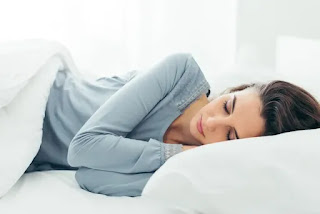Beauty sleep is more than just a myth. Getting a good quality night sleep can improve your overall physical and mental health. But for some people, sleeping well is not that simple. Countless studies have been made on the subject and came up with various ways to improve your quality of sleep, all coming up with tips that will help you get proper rest. One such study that was recently conducted at the University of British Columbia suggests that one way to sleep better is to smell the pheromones of your romantic partner. In fact, participants of the study were exposed to their partner’s scent and ended up sleeping better, even if the partners weren’t physically there when they slept!
No need for sleeping pills - One of the chemicals that regulate our sleep is melatonin, and when people have trouble sleeping they often take a melatonin supplement to help them sleep. Those supplements usually improve your sleeping quality by two percent. According to the study, sleeping with a partner’s scent (even if it’s just on the pillow next to you or wearing one of their shirts as pajamas) can improve your sleep quality just as well.
Testing it out - The research was conducted on a group of 155 subjects. At first, the subjects’ partners were given a shirt they had to wear for 24 hours. During that time, they were not allowed to use deodorant, smoke, or eat food that has an effect on their body odor. Then, each subject was given their partner’s shirt along with a different shirt that was either clean or worn by a stranger. Each shirt was then used as a pillowcase for the subject to sleep on, switching back and forth between the two. Each night of sleep was followed by a survey the participants filled out when they woke up, and the movements they make in their sleep were monitored by an actigraphy machine. Unsurprisingly, when sleeping on the pillowcase that had their partner’s pheromones on it, they moved less and felt more rested the next day.
Pheromones and their effect on women’s mood and sexuality
Pheromones are substances which are secreted to the outside by an individual and received by a second individual of the same species. Many examples exist in animals but their role in humans remains uncertain since adults have no functioning vomeronasal organ, which processes pheromone signals in animals. Yet pheromones can be detected by the olfactory system although humans under develop and underrate their smelling sense.
Pheromones may be present in all bodily secretions but most attention has been geared toward axillary sweat which contains the odorous 16-androstenes. One of these steroidal compounds, androstadienone, is present at much higher concentrations in male sweat and can be detected by women, albeit with wide variation in sensitivity. Upper-lip application of a pharmacological dose of androstadienonein women results in improved mood and heightened focus - particularly to capture emotional information. A positive mood is known to facilitate women’s sexual response, and increased focus improves sexual satisfaction. Indeed, some studies showed a beneficial effect of androstadienone on sexual desire and arousal. However, these effects were dependent on the context of the experiment, for example, on the presence of a male attendant.
Pheromones may also play a role in mate selection which is “disassortative” regarding the human leukocyte antigen (HLA)-genotype. Preliminary evidence suggests that exposure to androstadienone in women promotes attractiveness ratings of potential mates. In conclusion, some data indicate that 16-androstene pheromones, in particular androstadienone, play a beneficial role in women’s mood, focus and sexual response, and perhaps also in mate selection.
Breathing Can Affect the Way You Sleep
Let’s say you do everything in your power to ensure a good night’s sleep. You make sure the temperature in your room is perfect, you avoid screens before bedtime, you invest in natural sleep supplements, you’ve done it all. And yet, somehow, you find yourself waking up throughout the night or wake up feeling like you haven’t slept at all. Don’t give up hope quite yet – the answer may be in the way you’re breathing. So, how can you breathe for a better night’s sleep? Allow us to explain!
First off, you must understand the link between breath and sleep. You can’t expect to get a deep, restful sleep if you’re having trouble breathing at night. Studies have shown that patients who have been diagnosed with sleep apnea have a higher prevalence of insomnia. On the other hand, other studies revealed that 90% of all awakenings were led by sleep breathing events, despite no earlier diagnosed symptoms.
Nasal breathing is one way to ensure better sleep. Other than the fact that breathing through your nose filters bacteria and viruses and can support immune health, breathing through your nose allows you to retain more oxygen. You can get more oxygen with fewer breaths, as opposed to breathing through your mouth, which causes your tongue to fall back, blocking the airway. Individuals who breathe through their mouths are more commonly experience sleep disorders. But how do you make sure you’re sleeping through your nose if you’re asleep? Great question! There is a method called “mouth taping,” we know it sounds a bit absurd! Place a little piece of tape on your lips to help train your jaw shut, don’t use a large piece of duct tape; opt for blue painter’s tape. Take a small, stamp-size piece of tape, place it at the center of your lips. You’ll still be able to breathe, but you’ll be straining your jaw shut.

